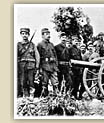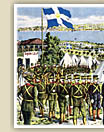|
|
 |
 |
 |
 |
 |
 |
 |
 |
 |
 |
|
[...] On 12/25 October, the Foreign Minister, sends an urgent telegram
to the Crown Prince about the victories of the Bulgarians and Serbs, adding verbatim:
"I believe that we should,
|

intensify our efforts
so as to occupy as soon as possible Thessaloniki and become effective earlier than
the Allies.
(Signature) L. Koromilas".
Twenty hours later Venizelos would say to Constantine stationed at Kozani:
"I await to let me know of the further direction, which the advance of the
army of Thessaly will follow. I only entreat you to bear in mind that important political
reasons require to reach Thessaloniki as soon as possible.
(Signature) Minister of Army Venizelos".
[...] However, Constantine notified Venizelos that:
"The army will not march against Thessaloniki. It is my duty to turn
to Monastiri, unless you forbid me to".
And the prime minister answered:
"I forbid you to!"
[...] Venizelos can see that Thessaloniki is being lost to Greece. On the night
between 24 and 25 October, after the news about the Bulgarian advance, the prime-minister
has been seized by real agony. Not being able to influence the Crown Prince
otherwise, he calls after midnight King George, residing in Gida. The adjutant answered
that the King was asleep. The prime-minister orders to wake him up and inform him of the
following, with the request that he convey it to his son, adding his fatherly voice:
|
 |

"I hold you personally responsible for the prevarication with which
you conduct operations, which threaten to bring the Bulgarians first in Thessaloniki".
[...] Even after this message, Constantine continued to act according to what he deemed
the military situation required. On the morning of 25 October from Topsi he commanded
his six divisions, the cavalry and the evzones detachments to make a wide encirclement of
Thessaloniki from the east. While the troops were deploying, in 4.30 p.m.,
the European consuls along with general Sadik surrendered Thessaloniki to the Greek repesentative
on behalf of the commander-in-chief Tahsin Pasha. The Crown Prince put harsher terms than those proposed
by the Turks. At the same time he put a deadline of sixteen hours in all, until
six in the morning of the following day, for the Turksih commander-in-chief to make
up his mind. Venizelos in Athens supposed that on the afternoon of the 25th
the Greek army would have occupied Thessaloniki. Instead of this he learns about negotiations
and deadlines. His worry turns into despair. His whole policy crumbles.
The future borders of Greece will remain to the south of Axios river. Under these emotions
he sends Constantine the following violent command through a telegram:
"To the Commander-in-chief: You are ordered to accept the offered to you
surrender of Thessaloniki and enter the city without further delay.
I hold you responsible for any prevarication, even of a monent.
(Signature) Minister of Army Venizelos".
To the consuls who surrendered Thessaloniki the Crown Prince said:
|
 |

"I have above all to render harmless the Turkish army facing me".
This intrasingent thought separated him from Venizelos. In theory the general was right.
In Athens and Berlin he had learnt that the fighting army has to exterminate the
enemy army and then occupy provinces or cities. But was there indeed a Turkish army
dangerous indeed facing the victorious Greek army? The Crown Prince was immediately informed
of the events taking place in Thessaloniki. He could be easily informed that "the
garisson of the city consisted of panicked fugitives from Yanitsa and a rabble,
recruited at random from the streets of the cosmopolitan city".
[...] A few minutes later, an envoy of Tahsin Pasha brought hurriedly
to the Crown Prince a written statement of the Turkish commander-in-chief
that he accepts the terms of the previous say and surrenders the city.
Constantine authorized the officers of the staff of Dousmanis and Metaxas
to go to Thessaloniki in order to sign the protocols of surrender. The relevant
formalities terminated at 11 at night.
G. Ventiris, I Ellas tou 1910-1920, Tomos Protos Athens, Ikaros editions,
1970, pp. 115, 119-120 and 121.
|
 |
 |
|
